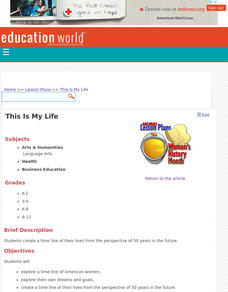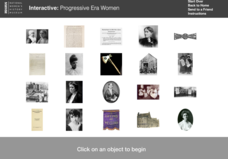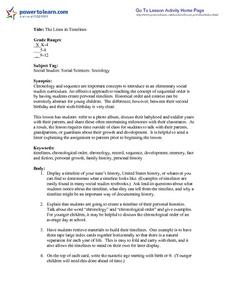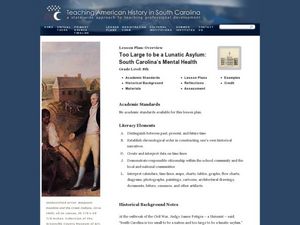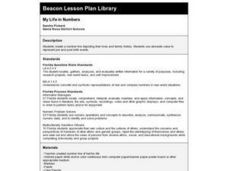Curated OER
What is History? Timelines and Oral Histories
Students determine that their lifetime shows just a small piece of history. They determine how two or more accounts of the same event can be different. They write an account of the same event from two perspectives.
Curated OER
What is History? Timelines and Oral Histories
Students consider how we learn about the past and discuss how the framing of history is always done by the person who is telling it. They construct a personal and class timelines, compare two or more accounts of the same event and record...
Curated OER
A Digital Family Tree Trip Through Time
Students research their family history by creating a family tree and using online tools. In this family tree lesson, students use bubbl.us to research their biographical information and web the data. Students create timelines for their...
Curated OER
Family History
Fourth graders identify primary source items in the study of their families. They relate the importance of primary source materials in understanding history and events of the past.
Curated OER
This Is My Life
Students create a time line of their lives from the perspective of 50 years in the future.
Curated OER
Origin of the Modern Summer Games
Where did the Olympic Summer Games originate? The class takes a look at ancient origins of modern Olympic games. They research the Olympics and write a compare and contrast essay that describes how the Olympic Games have changed since...
Curated OER
History at Home: The Object Box
Students examine "artifacts". In this anthropology lesson, students analyze possible uses for objects such as washboards, hot water bottles, and old magazines. Students record and share their speculations with their classmates.
National Woman's History Museum
Progressive Era Women
The National Women's History Museum provides this interactive resource that permits users to explore women who played key roles during the Progressive Era in the quest for workers' rights, the Settlement House Movement, the Suffrage...
Curated OER
Travel Through Time with a Family Member
Students interview a family member. In this interviewing lesson, students choose a family member to interview and write about. Students create a PowerPoint about the person including a timeline, photographs, and a narrative about their...
Curated OER
The Lines in Timelines
Young scholars are introduced to the concept of sequence by creating their own personal timeline. As a class, they put the events of the last week of their lives into the correct order and determine what information should be used for...
Curated OER
Discovering Your Community
Pupils focus on the origins of the families that make up their community by exploring their family's origins through themselves, parents, and grandparents. Students create a map marked with family origins for the class.
Curated OER
Eighteenth-Century Slave Codes
Students explore slavery by reviewing the written laws intended to keep African Americans subservient. In this U.S. slavery lesson, students analyze a time-line of the history of African Americans. Students discuss the patterns of the...
Curated OER
Interviewing A Parent
Students conduct an interview with a family member to research their family history. They prepare a list of questions, conduct the interview, and determine which house to visit for an artifact search.
Newseum
The Women Who Made the Movement
Granting women the right to vote was a long time coming and took many efforts. Young historians select one woman involved in the suffrage movement to research. They compare and contrast the depictions of their subject in mainstream...
Curated OER
Who's Who In My Family (Book Share)
Students read Who's Who In My Family, relate the story to their own family relatives, traditions and heritage and compare with classmates. They make their own family trees and form a live action family tree.
Curated OER
Too Large to be a Lunatic Asylum: South Carolina’s Mental Health
Eighth graders examine the history of South Carolina's mental institutions. In this South Carolina history lesson, 8th graders discover details about asylums built in the state in the 1800's. Students analyze primary sources about mental...
NET Foundation for Television
1850-1874 African American Settlers
Go West, young man! Scholars investigate the impact of African American settlers moving to the Nebraska territory, following the passage of the Kansas-Nebraska Act in the mid 1800s. Using primary sources, timelines, maps, and...
Curated OER
Learning From the Past
Coming up on the Olympics? Be sure your middle schoolers understand the dynamic and ancient history of this global tradition. They begin by recalling traditions parents have passed down, considering their relevance and ways they might be...
Curated OER
Family Stories and Personal Narratives
Fourth graders read various stories in their literature books about families. Individually, they make a timeline showing the most important events in their lives. They bring in one artifact from their lives and write a paper about it...
Curated OER
Civil War Time Line
Students draw a time line on graph paper on a scale of one square to every five years beginning in 1770 and ending at 2000. They place historic events and inventions in their correct time period on the time line, and add their birthday...
Curated OER
Annotated Time Line
Students write biographies and timelines of famous people. They research a famous historical figure and his associated events. They write a two-page biography of the figure and create a timeline detailing the events of his life. They...
Curated OER
Our Family Tree
Students investigate their family heritage and plot their timeline. In this research lesson students study their family tree and forestry.
Curated OER
My Life in Numbers
Have fun while your class creates a timeline of their lives. They record events before and after they were born on a line with 10 integer pairs consisting of one integer on each side of zero. Many extension activities can be done in...
Curated OER
Anne Frank: Timeline
Students brainstorm all they know about World War II and Anne Frank. They create a timeline of the events that occured. They research the events on the timeline in their own family history.






